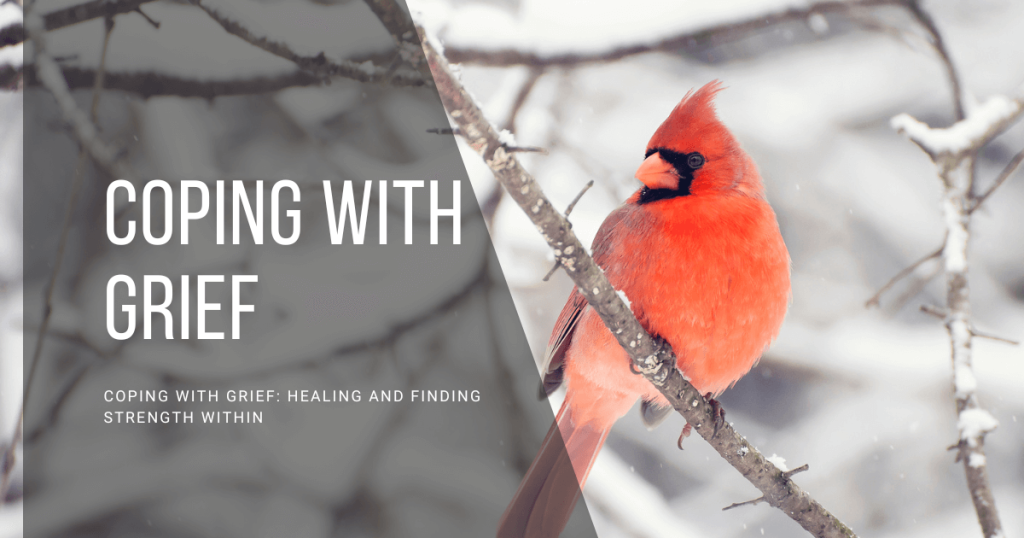“The reality is that you will grieve forever. You will not ‘get over’ the loss of a loved one; you will learn to live with it. You will heal, and you will rebuild yourself around the loss you have suffered. You will be whole again, but you will never be the same. Nor should you be the same, nor would you want to.”
– Elisabeth Kubler-Ross, psychiatrist and author of On Death and Dying
What is Grief?
Grief is an emotion that touches the very core of our being. It’s a complex mix of feelings, thoughts, and physical sensations that arise from loss. Understanding and navigating grief is a universal human experience, and today, I want to share my own journey through grief, its definition, causes, and symptoms. But beyond that, I also want to offer hope and healing by sharing coping strategies and a call to action for embracing your own grief journey.
Defining Grief:
Grief, simply put, is the emotional response to loss. While often associated with the death of a loved one, grief is an emotion that transcends such boundaries. It can manifest in various forms such as the loss of a job, a relationship, a cherished dream, or even one’s sense of self. At its core, grief is a natural and necessary process of mourning the things we hold dear.
Causes of Grief:
Grief can be triggered by a multitude of events, including death, divorce, illness, job loss, or any significant change or transition in our lives. It’s a response to the void left behind when something or someone we love is no longer there.
Symptoms of Grief:
Grief is often accompanied by a rollercoaster of emotions, which may include sadness, anger, guilt, confusion, and even relief. It can show up in various ways, affecting our thoughts, emotions, and our physical well-being. Common symptoms include:
Emotional Turmoil:
Intense Sadness: Grief often feels like being overwhelmed by profound sadness. It’s not just a passing feeling; it’s a deep, pervasive sorrow that can be all-consuming.
Loneliness: The absence of the person or thing we’ve lost can create an overwhelming sense of loneliness. We may feel disconnected from the world and those around us.
Deep Sense of Loss: At the core of grief is an inescapable sense of loss. This loss can manifest as a heavy burden, a constant reminder of what we once had and have now lost.
Anxiety: It is very common to feel anxious or worried after experiencing the death of a loved one or the loss of something significant in your life.
Cognitive Changes:
Difficulty Concentrating: Grief can scatter our thoughts and make it challenging to focus on tasks or even simple conversations. Our minds may frequently drift back to the source of our grief.
Forgetfulness: It’s common to experience forgetfulness during grief. Mundane details and daily responsibilities can slip from our memory as we deal with our emotions.
Sense of Detachment: Grief can create a feeling of detachment from the world around us. It’s as though we’re watching life unfold from a distance, and we may struggle to fully engage in the present.
Physical Symptoms:
Insomnia: The emotional turmoil of grief can disrupt our sleep patterns, leading to insomnia. We may find it difficult to fall asleep or stay asleep throughout the night.
Fatigue: Grief is mentally and emotionally exhausting. The constant processing of emotions, coupled with sleep disturbances, can leave us feeling physically drained and weak.
Change in Appetite: Grief can affect our appetite, leading to either a loss of interest in food or, in some cases, emotional eating. Changes in eating habits are common during this time.
Physical Pain: The emotional pain of grief can sometimes manifest as physical discomfort. It might be in the form of headaches, muscle tension, or even gastrointestinal (stomach) issues.
Behavioral Changes:
Social Withdrawal: Grief often prompts us to withdraw from social interactions. We may isolate ourselves from friends and loved ones, finding it difficult to engage in the usual social activities.
Changes in Routine: The disruption caused by grief can lead to significant changes in our daily routines. Tasks we once completed without a second thought may become challenging to manage.
Increased Irritability: The emotional rollercoaster of grief can make us more irritable or quick to anger. Everyday frustrations may become more pronounced during this time.
Understanding these common symptoms of grief is crucial, as it allows us to recognize that grief is not just an emotional experience but a holistic one that affects our thoughts, emotions, and physical well-being. It’s a testament to the profound impact that loss can have on our lives.
My Personal Journey Through Grief:
I am no stranger to loss or grief. There have been many instances of grief throughout my life, but as I write, there are three periods of my life that I want to discuss: my father’s imprisonment, the end of my football career, and the loss of loved ones.
My Father’s Imprisonment:
When I was just eight years old, my world was shaken by an event I couldn’t fully comprehend at the time. My father’s imprisonment led to one of the most significant periods of grief in my young life. The abrupt and unexplained absence of a parent is a devastating experience for any child. While my father was not an everyday presence in my life prior to going away, knowing he could show up for me in times of need was a reassurance that I no longer had. I remember the confusion, anger, resentment, and sadness that overwhelmed me. It was a confusion born from not fully grasping the reasons behind his incarceration and the sudden void it created in my life. Anger and resentment toward the criminal justice system, which I had grown to distrust, and at my father, feeling he must’ve deserved this consequence. And the sadness that was marked by countless tears of a young boy who felt abandoned in the world. It was a sadness that seemed to seep into the very fabric of my being, a heavy burden I couldn’t shake. This was one of my first encounters with grief, an emotion that would revisit me throughout my life.
The End of My Football Career in College:
As an athlete, I poured my heart and soul into my football career. It was more than just a sport; it was a passion that defined me. It was a vessel that created opportunities for me to change the trajectory of my life and opened doors to a brighter future. Every ounce of effort, every early morning practice, and every injury endured were investments in a dream I had pursued for years. However, as many wise former athletes will tell you, the game ends for us all. The end of my football career came to a halt after a difficult decision I had to make during college. Do I continue to play this game or focus more heavily on my academics and prepare for life after football? I chose the latter with years of eligibility left on the table. And while I would go back and make the same decision a million times over, it wasn’t an easy transition. I felt I had lost a part of me; my sense of self was shaken. The sorrow I felt in my heart prevented me from watching or even talking about football for over a year. It was yet another chapter in my journey through grief, where the loss of a dream, an identity, a sport, and a true love felt as substantial as the loss of a person.
The Loss of Loved Ones (Death and Estrangement):
In the span of a single, tumultuous year, I confronted the heart-wrenching reality of losing cherished loved ones through both death and estrangement. The weight of this compounded grief was unlike anything I had ever known. The death of those we hold dear is a unique kind of pain, a visceral reminder of the impermanence of life. It leaves an emptiness that words struggle to capture, a void that can never truly be filled. But the grief I experienced wasn’t confined to the realm of mortality. Estrangement, the painful act of being severed from loved ones by choice, introduced me to another facet of loss. Over the years, I’d grown familiar with loss by death, but to lose someone whose heart beats every day is a different kind of pain. The fracture of bonds that once felt unbreakable left me grappling with questions, guilt, and an imaginable ache. It was a year where grief seemed to be a constant, an ever-present companion, and it tested the depths of my emotional resilience in ways I could never have anticipated.
In these three pivotal moments of my life, I encountered grief in its various forms. Each instance left its unique imprint on my journey, and together, they have contributed to my understanding of the profound and complex nature of this emotion. Grief, I have come to realize, is not a one-time visitor; it is a lifelong companion, and how we navigate it shapes the essence of who we are. While I once believed that we could outgrow grief, I now know that we merely grow around it.
Coping with and Healing from Grief:
Grief is a deeply personal journey, one that doesn’t follow a linear path or adhere to a universal timetable. Each person’s experience of grief is as unique as a fingerprint, shaped by the contours of their relationship with loss and the depths of their emotions. However, amidst the complexity and individuality of this journey, there are several strategies that can serve as guiding lights through the darkness of grief.
1. Allow Yourself to Grieve:
I like to say, “Allow yourself to feel what you feel in order to heal.” Grief is not an emotion to be stifled or suppressed. It’s a natural response to loss, and it demands to be acknowledged. Give yourself permission to feel the full spectrum of your emotions, no matter how messy or painful they may be. It’s okay to be sad, to feel anger welling up within you, or to be engulfed by confusion. These emotions are not signs of weakness; they are the raw, honest expressions of your heart’s response to loss and a true mark of the human experience. By allowing yourself to grieve, you give your emotions space to breathe and heal.
2. Seek Support:
Grief can be an isolating experience, but you don’t have to navigate it alone. Reach out to friends, family members, or support groups who can empathize with your pain. Sometimes, sharing your feelings and memories of your loved one can be incredibly cathartic. It’s not about finding solutions or quick fixes; it’s about having a safe space where you can express yourself without judgment. The power of human connection in times of grief cannot be overstated; it reminds us that we are not alone in our sorrow.
3. Self-Care:
Grief takes a toll not only on your emotions but also on your physical and mental well-being. It’s essential to prioritize self-care during this time. Get enough sleep, as rest is crucial for emotional resilience. Eat well, nourishing your body with nutritious food that can help stabilize your mood. Don’t forget to hydrate. With every tear shed, water leaves your body so replenish it. Engage in activities that bring you joy, even if they provide only fleeting moments of relief. These small acts of self-compassion can serve as anchors amidst the storm of grief, offering moments of respite and healing.
5. Professional Help:
Grief can become overwhelming and persistent, making it difficult to navigate on your own. If you find that your grief is affecting your ability to function in daily life, impacting your relationships, or leading to prolonged periods of despair, it may be time to consider seeking professional help. Therapists and counselors experienced in grief can provide valuable guidance and coping strategies tailored to your specific needs. They offer a safe, non-judgmental space where you can explore your grief in-depth and work through the complex emotions that accompany it.
I will add that grief counseling was my first introduction to professional therapy. It felt less stigmatized for me to talk about the loss of a cherished loved one as opposed to any other mental condition I needed to address. I’m so happy I made that decision because it was a huge catalyst in my overall healing journey.
Remember, healing from grief is not about erasing the memory of your loved one or the pain of loss; it’s about finding a way to carry that love and pain forward in a way that allows you to move through life with renewed strength and purpose. We don’t outgrow grief, we grow around it. While the journey may be long and arduous, the journey will be marked by resilience, acceptance, and, ultimately, hope.
Resources for Grief
American Counseling Association: https://www.counseling.org/knowledge-center/mental-health-resources/grief-and-loss-resources
Good Grief: https://good-grief.org/resources/
Hospice Foundation of America: https://hospicefoundation.org/Grief-(1)
Alive Hospice (For Middle Tennessee Residents): https://www.alivehospice.org/resources/patients-families/grief-support-resources/







